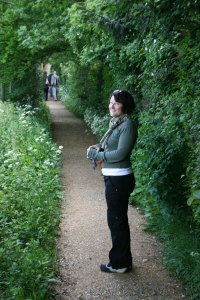Around May, I somehow ended up with a whole glut of projects and publications that were in revision, near completion, in draft, or fully designed and just waiting for words on paper. All that each of them needed were some short chunks of time: a day, two or three, or a week. Concentrated, non-disturbed time.
I should say that have the fortune, at this stage of my career, to work at a research institute without class teaching or administrative duties, so one would think that it would be easier to have those blocks of time. But distractions expand to fill the available space, and there’s always another seminar, a conference, an interesting chat with a colleague, a discussion about a potential project, time spent with research group members, and I am nothing if not distractable. Eventually it became clear that I had to get hardcore about it or my CV would have nothing but conference talks* with no ensuing publications.
So – a break was required. I blocked out two periods of three weeks in July and August (this is the first week of the second one), with a week in between to catch up and then have a break (it *is* summer). Our institute is pretty quiet in these months, so there’s much less going on in terms of meetings and commitments anyhow. Three weeks seemed to be an acceptable period of time – enough to get into stuff but not more than the psychological barrier of a month. With no funds available for a retreat in the Alps, I just decided notto be at my desk and took a change of scenery approach. Most of the time I’ve worked from home, or in the public or work library, but I also spent five days in Amsterdam house-sitting.
I did make a commitment to go into the office one day a week, which I did because I felt a bit anxious about total selfish abandonment of my colleagues, especially students and research assistants. But this is probably just an inflated sense of my own indispensability, and this second period I’ll go in tomorrow and then probably only if there’s something vital.
So what did I accomplish in #ProjectReadWrite, as I’ve been calling it on Twitter? The first period I picked the low-hanging fruit, but I:
- Submitted a paper on population size and language change, coauthored with Tom Currie
- Submitted a paper on comparative cognition with Daniel Haun, Giorgio Vallortigara and Nicky Clayton
- Did the revisions on a paper (my first single-author publication!) on kin-term evolution
- Did the revisions on a BBS commentary with my group leader, Michael Dunn
- Read about 15 papers, variously on marriage transfers, semantic change, coalescent theory, and Pacific prehistory
- Completed a peer-review (my policy: one-out, one-in. I’m now in arrears)
- Caught up my backlog of journal-content alerts, dumped them all into Google Reader and now feel on top of the literature (as much as one can!)
- Thought through the theme for a grant proposal
- Strategised how to pull a bunch of disparate projects together into just two manuscripts
- And yesterday – I actually consolidated all of my computer files into an organised and navigatable system.
This next period I hope to finish the revisions on one more manuscript (two if I get reviews back), and write the bulk of another. Extra reading for that has made me think I might need to revisit the analyses as well, but it’s all about pushing things forward (and out!), so I’ll be happy just chugging it along.
I’ll post again on my evaluation of how useful this has been at the end of August.
* I am a sucker for the pleasure of designing a conference presentation.
